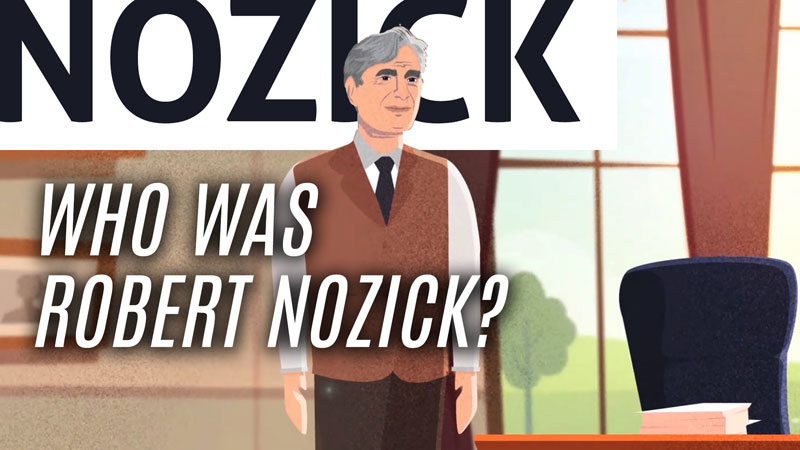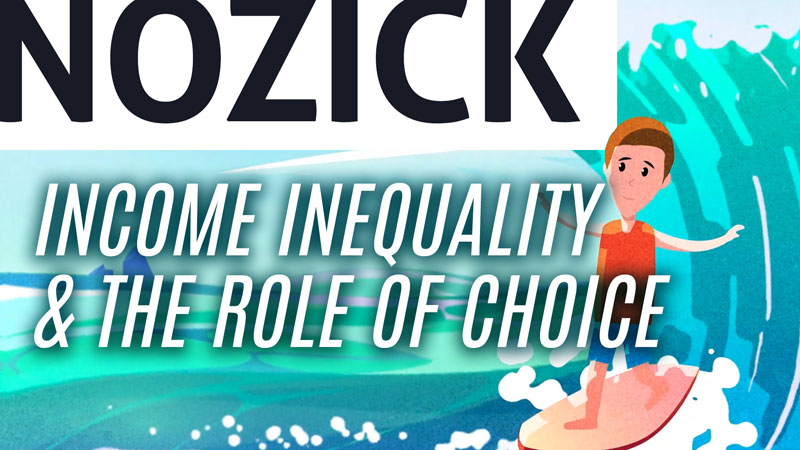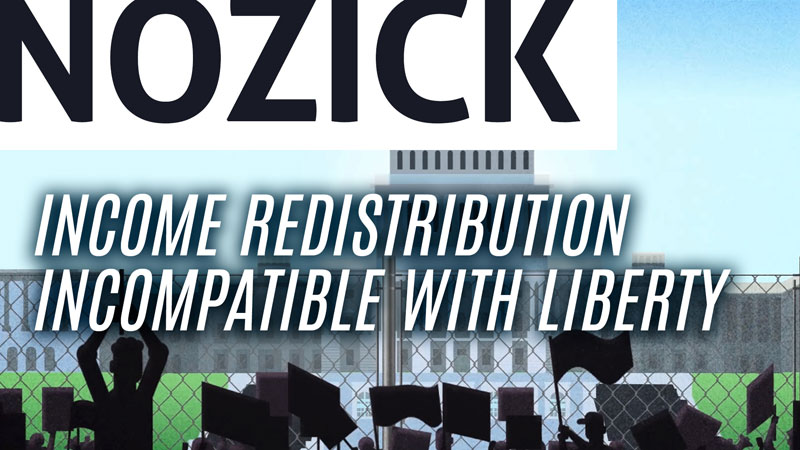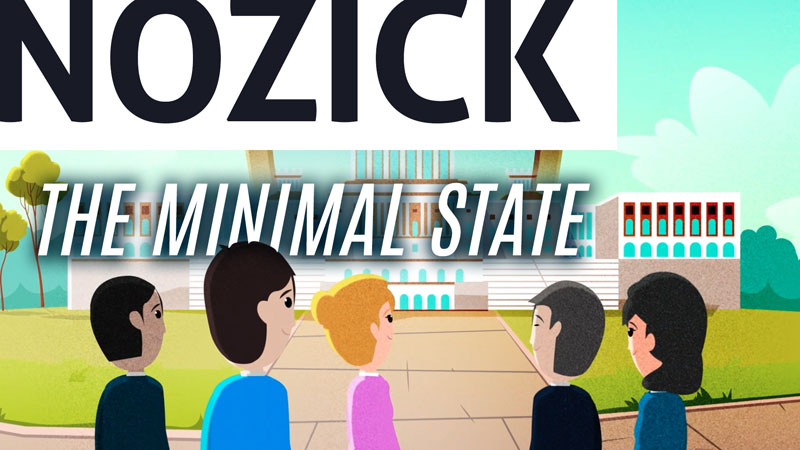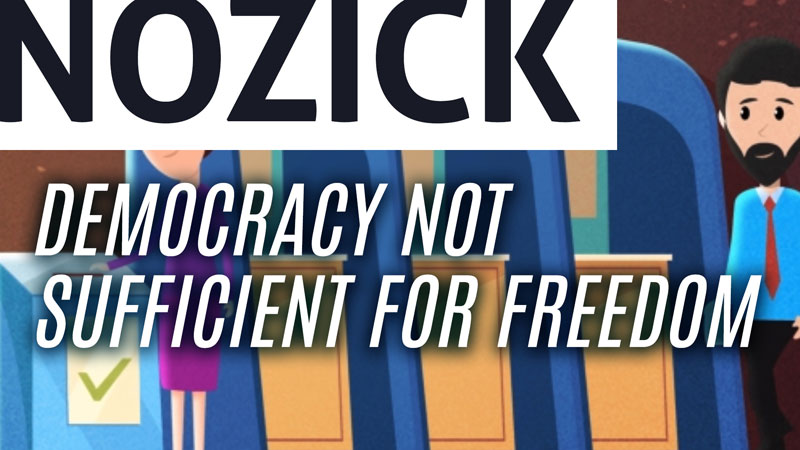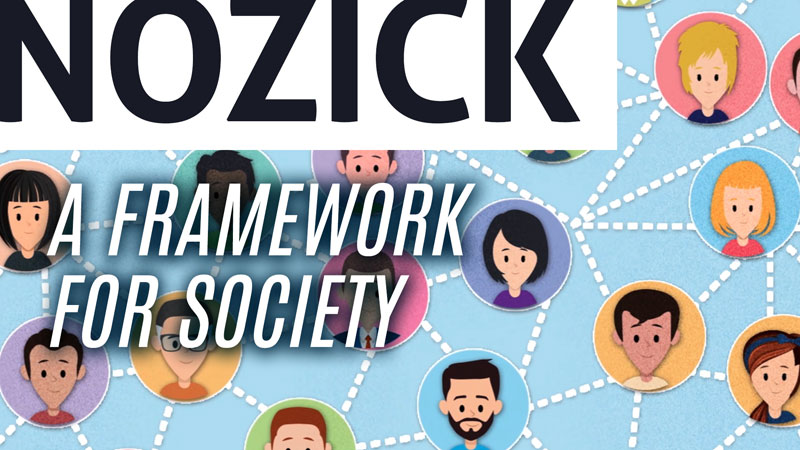by Aeon J. Skoble
Robert Nozick was a professor of philosophy at Harvard University who is most famous for his contributions to political philosophy. His 1974 book Anarchy, State, and Utopia helped establish the classical liberal or libertarian perspective as a viable alternative to redistributive egalitarian liberalism and to socialism. Despite many philosophers’ disagreements with Nozick’s arguments, those arguments could not be ignored.
Robert Nozick was born in Brooklyn, New York, in 1938, and received his undergraduate degree at Columbia University in 1959. At Columbia he was active in socialist politics, but during his time there and in graduate school at Princeton University, he was exposed to a variety of political perspectives, and he notes in the preface to his most famous book, Anarchy, State, and Utopia, that it was discussions with friends that “led me to take libertarian views seriously enough to want to refute them, and so to pursue the subject further.” This included ideas such as individual rights, the need for limits on government, and the wealth-growing mechanisms of a free market system.
Nozick was a professor of philosophy at Harvard University for almost his entire career. When he was a student, libertarian ideas were being discussed in economics departments, and he mentions being exposed to thinkers such as Ludwig von Mises, Friedrich Hayek, Milton Friedman, and Murray Rothbard, whose economic liberalism overlapped political liberalism. Nozick’s work is thus philosophical, but richly informed by economics, and has played a critical role in securing a respectable place in academic discourse for the classical liberal perspective. Towards the end of a distinguished career as an academic during which he wrote a total of six books on a diverse range of subjects, Nozick was diagnosed with stomach cancer in 1994 and he passed away in 2002. Nozick’s last book, Invariances, was published in 2001. He had been a Fulbright Scholar at Oxford University, President of the American Philosophical Association, and was Pellegrino University Professor at Harvard, that university’s highest honour. Praise for Anarchy, State, and Utopia’s clear and accessible writing style crossed ideological lines, and it won the National Book Award in 1975. Agree or disagree, Anarchy, State, and Utopia makes thought-provoking arguments that cannot be simply waved away.
Listen In
Listen to the Essential Scholars Explained podcast with host Rosemarie Fike in conversation with the author, Dr. Aeon J. Skoble to discuss the work, life, and ideas of Robert Nozick.

Robert Nozick Part 1: Why People Exist for Their Own Sake and Purposes
Dr. Aeon J. Skoble, Professor of Philosophy at Bridgewater State University and author of The Essential Nozick, joins host Rosemarie Fike to talk about Nozick's somewhat unconventional rise to prominence in the field of philosophy, as well as discuss Nozick’s key insights on morality, individual rights, limited government and the free market.
Robert Nozick Part 2: An Examined Life
Dr. Aeon J. Skoble, Professor of Philosophy at Bridgewater State University and author of The Essential Nozick, once again joins host Rosemarie Fike to discuss Nozick's perennial philosophical insights and how they might be applied today, including personal autonomy, the inherent morality in limited government, and even what a future society based on these core principles could look like.
Download the Book
Get a digital copy of the book. Choose the version you prefer below.
Explore the Book
Chapter by chapter summary of the book.
-

Chapter 1
Theory of Rights
Nozick begins Anarchy, State, and Utopia with the claim “Individuals have rights, and there are things no person or group may do to them (without violating their rights)” (p. ix). Incautious critics sometimes take this to mean that Nozick simply assumes rights and then proceeds from there, but he does have an argument for rights. For better or worse, this doesn’t appear until the third chapter of the book, but it is there. He understands rights as “moral side constraints upon what we may do” (p. 33). If there were no other beings, we would be free to do whatever we wanted to do, constrained only by the laws of physics.
-
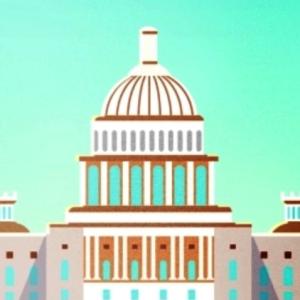
Chapter 2
The Minimal State
A robust theory of rights such as the one Nozick outlined poses a significant challenge to political philosophy. If people’s rights cannot be overridden, then most forms of government we’re familiar with lack moral legitimacy. This might imply the moral necessity of anarchism. While for some people, that sounds like a conclusion so obviously wrong it requires no answer, Nozick thinks it worth taking seriously. “The state” seems like it necessarily violates rights: rulers of various stripes lay down the law and force people to comply on pain of fine, imprisonment, or death. Some laws might map onto some people’s predispositions anyway, but the coercion is there nonetheless. For example, maybe I think it is prudent to wear a seat belt when driving and would do it even if there were no laws compelling it, but as it happens, there are laws compelling it, which means coercion is being deployed even if my choices are not in this instance coerced. I could not change my mind, and others who think differently are coerced already. And the state’s operations are financed coercively, via taxation. Since this, too, is coercive, individualist anarchists have a point which we cannot simply ignore: the state is coercive in its very nature, and this is morally problematic for anyone who takes rights seriously. So Nozick sees it as incumbent on himself to explain how some sort of state could be possible without violating people’s rights.
-

Chapter 3
Entitlement Theory
Having demonstrated in Part I of his book that the minimal state can be justified, Nozick set himself the task in Part II of showing that the minimal state “is the most that can be justified. Any state more extensive violates people’s rights” (p. 149). He turns first to arguments for more extensive state power that are based on a concept of distributive justice. He addresses this primarily by means of what he calls the “entitlement theory,” which also sets the stage for the application of his theory of rights to various other issues in political economy.
-

Chapter 4
How Liberty Upsets Patterns
In his development of the entitlement theory, Nozick had argued that just holdings do not come about because they fit a preconceived pattern, but because they are the result of people engaging in just processes. He then uses a clever and now very famous thought experiment to demonstrate why patterned, end-state conceptions of distributive justice are necessarily incompatible with individual freedom. This incompatibility turns out to reveal an internal incoherence in patterned theories. The thought experiment involves Wilt Chamberlain, a professional basketball player whose name, at the time of the book’s publication, would have been very familiar to readers. As I summarize the argument (pp. 160-164), feel free to mentally substitute the name of any well-known professional athlete today.
-
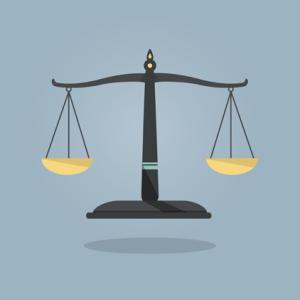
Chapter 5
Liberal and Socialist Conceptions of Distributive Justice
Nozick’s general critique of patterned theories of distributive justice leads him to a specific consideration of one of the most well-known and influential of such theories, John Rawls’ 1971 A Theory of Justice, the now-canonical argument for mitigated economic liberty and redistribution. Nozick begins by praising the book, which he calls “a powerful, deep, subtle, wide-ranging, systematic work in political and moral philosophy which has not seen its like since the writings of John Stuart Mill, if then” (p. 183). And he also notes its influence, already huge in 1974 when Anarchy, State, and Utopia was published, and larger today: “Political philosophers now must either work within Rawls’ theory or explain why not” (p. 183). This encomium does not seem like mere formal politeness towards a colleague, but rather as very genuine admiration. Nevertheless, Nozick then proceeds to explain why he rejects the Rawlsian framework.
-

Chapter 6
Redistribution and the Growth of the State
The discussion of redistributivist arguments leaves Nozick in a position of having demonstrated that while the minimal state can be justified over the objection of individualist anarchists, no more extensive state can be. But he anticipates objections that the minimal state would be “frail and insubstantial” (p. 276). He addresses this sort of objection with a thought-experiment about the growth of the state which reveals how the subtle expansion of government power inevitably leads to rights violations.
-

Chapter 7
A Framework for Utopia
Having demonstrated that the minimal state is justified but that only the minimal state is justified, Nozick also wants to show that the minimal state is morally inspiring, a positive good. He begins this discussion by considering what “utopia” might even mean. He says that it is “impossible simultaneously and continually to realize all social and political goods,” but that the idea is nonetheless worth investigating (p. 297). Why would it be impossible? Because everyone is different. “The world, or all those I can imagine, which I would most prefer to live in, will not be precisely the one you would choose” (p. 298). But underlying this problem, indeed what makes it a problem in the first place, is the idea that society consists of multiple people who have to have some way of living together. So utopia would have to be the best possible world that all could live in. The requirements of social living have to be reconciled with the fact of human pluralism and diversity.
About the Author

Aeon J. Skoble
Aeon J. Skoble is a Senior Fellow at the Fraser Institute and a professor of philosophy at Bridgewater State University in Massachusetts. Widely regarded for his innovative methods of teaching economic key concepts and the philosophy behind markets and voluntary exchange, Professor Skoble has frequently lectured and written for the US-based Institute for Humane Studies, Cato Institute, and the Foundation for Economic Education. He is the author of Deleting the State: An Argument about Government (Open Court, 2008), the editor of Reading Rasmussen and Den Uyl: Critical Essays on Norms of Liberty (Lexington Books, 2008), and co-editor of Political Philosophy: Essential Selections (Prentice-Hall, 1999) and Reality, Reason, and Rights (Lexington Books, 2011).
He is also the co-editor of The Simpsons and Philosophy and three other books on film and television. Skoble received a BA from the University of Pennsylvania, and his MA and PhD from Temple University.
Additional Resources
Listed below are links to other websites and resources where you can learn more about Robert Nozick, his written works, his lectures, and interviews.
Listed below are links to other websites and resources where you can learn more about Robert Nozick, his written works, his lectures, and interviews.
Nozick on Rights, Justice, and Government
Aeon J. Skoble explores Nozick’s theory and moral rationale for taking people’s rights seriously. What does a utopia actually look like?
Robert Nozick, Philosopher of Liberty
A brief history detailing how Nozick’s work and presence in academia emerged during and somewhat in response to the mainstream rise of popular socialist ideas and his contemporary, John Rawls.
Robert Nozick’s Political Philosophy
A detailed breakdown of Nozick’s life, influences, and philosophical ideas (such as the Minimal State versus Individualist Anarchism).
Robert Nozick from the Internet Encyclopedia of Philosophy
An explanation/timeline of Nozick’s work and theories relevant to political philosophy, as well as the metaphysical and notions of objective reality.
Robert Nozick from Questia.com
A list of books and articles by and/or related to Nozick and his work.
Robert Nozick from The Information Philosopher
Notes and excerpts from Nozick’s work related to his notions of Free Will, Choice and Determination, and Epistemology.
How Nozick Became a Libertarian
A brief historical note detailing how Nozick began as a social democrat at the beginning of his graduate studies at Princeton to a figurehead of the Libertarian movement in his later academic career.
Why Do Intellectuals Oppose Capitalism? A CATO Policy Report (1998)
A philosophical and practical examination of why academics and intellectuals seem to overwhelmingly denounce capitalism and free-market liberal ideas in favour of socialist ideology.
Robert Nozick’s Final Interview
A transcribed interview between Nozick and Julian Sanchez, discussing his popularized ideas, voluntary choices, ethics and libertarianism, and evolutionary morality.
Robert Nozick Interview 1990
A rare, nearly hour-long interview with Robert Nozick. Interviewed by Michael Toms from New Dimensions Radio. Interview date: November 30, 1990.
Robert Nozick and the Good Fight
An article by David Kelley (from March 2002) discussing Nozick in the context of economic theory, Rand, and the overarching influence of a socialist society that would contradict the actions of consenting adults.
Robert Nozick on Austrian Economics
An article by David Gordon breaking down Nozick’s relationship to the Austrian school, including his criticisms of it.
Exotic Journeys: A Tourist's Guide to Philosophy
A site comparing the interactions of several popular philosophy contemporaries, with this particular section dedicated to Rawls and Nozick. Covers their differing and intersecting positions on principle and justice.
Moral Complications and Moral Structures
A PDF of the scholarly text by Nozick, provided by the University of Notre Dame Law School.
Robert Nozick, Libertarianism, And Utopia
A response to critiques of Nozick’s work, as part of the “Critiques of Libertarianism” series.
Nozick, Libertarianism, and Thought Experiments
A defense of Nozick’s work, including some of Nozick’s own words.
Anarchy, State, and Robert Nozick
Transcription of the Libertarian Tradition podcast episode "Robert Nozick."
Nozick—An Appreciation
Account of author’s time meeting Nozick, and personal takeaways where his character was indicative of his philosophical teachings.
Essential Scholars is brought to you by

Fraser Institute
Institute for Economic Affairs
Institute of Public Affairs
Foundation for Economic Education
Acknowledgements
Made possible by generous grants from the Lotte and John Hecht Memorial Foundation, the John Templeton Foundation, and the Peter and Joanne Brown Foundation.






